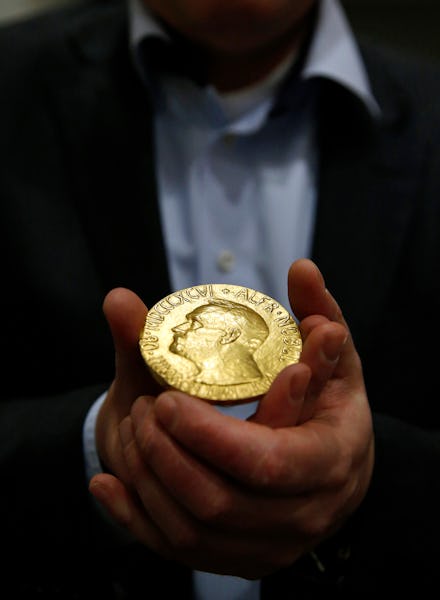The U.S. Leads the World in Nobel Laureates Thanks to One Surprising Factor

The news: It's Nobel season, and while we're still waiting on the prizes for literature, peace and economics, several Americans have already been awarded so far, a couple of whom demonstrate a decidedly international bent.
The team awarded for the medicine prize included John O'Keefe, an American-born British citizen at University College London; the team's research involved how brains create a sense of space and environment. As for the physics prize, the awarded team included Shuji Nakamura, a Japanese-born American citizen at University of California, Santa Barbara; the team was recognized for inventing blue light-emitting diodes.
So what's the big trend?
There have been a lot of foreign-born American laureates. Nakamura's case is just the latest. Last year, a George Mason University study found that, historically, "foreign-born scientists and engineers are over-represented among U.S. Nobel Laureates."
According to the study, Americans have traditionally done well in terms of Nobel recognition. Since the prizes' inception, U.S. citizens have constituted a whopping 42.4% of laureates. But more interestingly, 30.7% of those award recipients had immigrated to the U.S.
While Canada was the most common place of birth for foreign-born U.S. laureates, there is pretty good geographical distribution throughout the rest of the world:
The trend is especially noticeable among recipients of the economic and science prizes:
What does this mean? While critics of this trend might say this is further evidence of the U.S. brain drain taking away foreign talent, these days, the brain drain seems to be running in the other direction: With decreasing academic funding and professorships, an increasing number of Americans are actually finding opportunities abroad.
And the prevalence of foreign-born U.S. Nobel laureates also demonstrates the boon of immigration and why this is a strategic investment for America.
"Not all immigrants will become Nobel Prize laureates, but what are the costs if they don't achieve their highest potential?" George Mason University sociology professor James Witte wrote for the Huffington Post last year. "It will be our own loss, as a nation, if immigrants are denied the opportunity to develop their talents and abilities; or if they don't feel welcomed and decide to take their high achievements and entrepreneurial abilities elsewhere."
At a time when 35% of international students in America are pursuing science, technology, engineering and mathematics fields, it becomes more and more imperative for academic institutions and communities to create attractive environments for both U.S. and foreign-born talent.